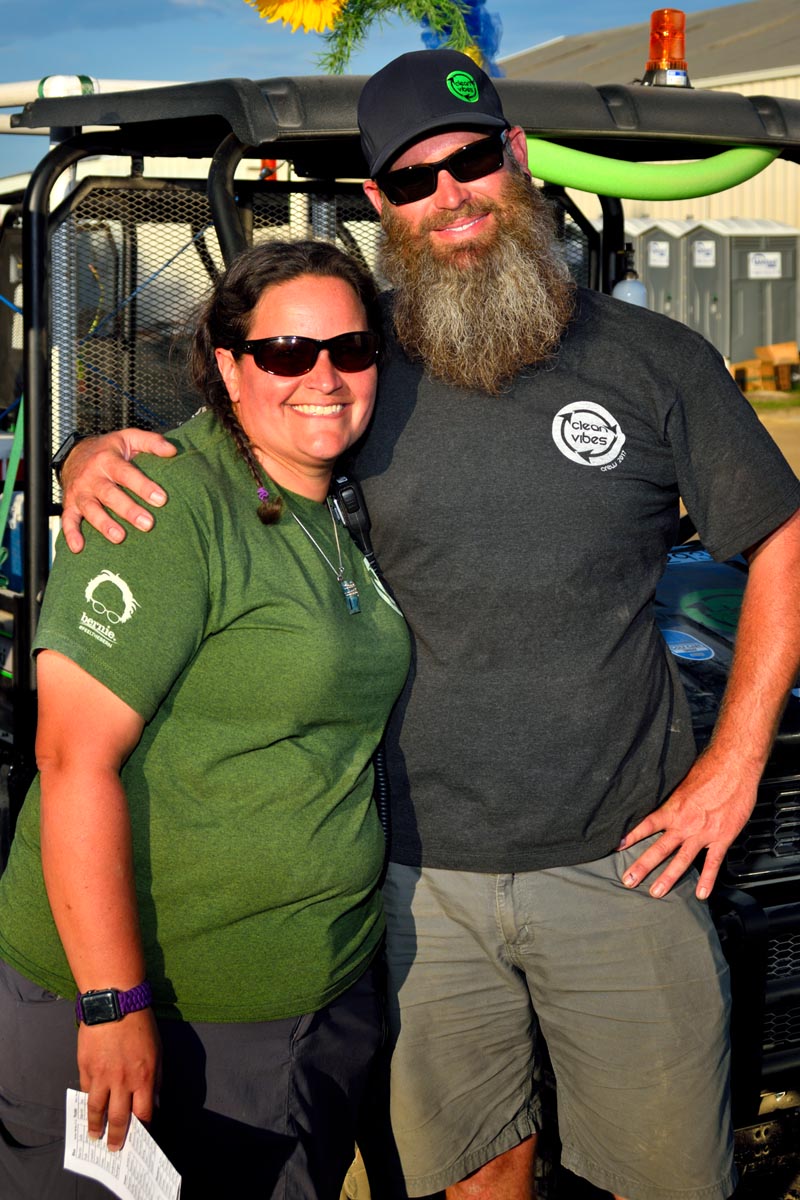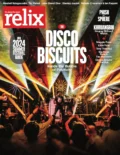
Anna Borofsky’s love for music and environmentalism is the kinship that formed Clean Vibes. A University of Vermont alumni along the likes of Phish, whose Lemonwheel festival was the kickstart to the almost 20-year-old clean-up, Borofsky’s mission to take on music festival trash has gained her notoriety since the beginnings of Bonnaroo—which the North Carolina-based company has worked with following its inception in 2002.
“We’re creating a city,” says Borofsky, “And we’re showing people that within that city that we just created in a field that we can divert a huge amount of waste and that it is a simple, manageable thing to achieve.” Clean Vibes has since diverted almost 16 million pounds of waste from event sites and continue to work with festivals throughout the nation, most recently Tortuga and Okeechobee Festival as well as a return to Bonnaroo in June, while branching out to working non-musical events after opening a San Francisco branch in 2008.
With a goal that counterbalances maintaining festival grounds, educating on the impacts of Clean Vibes’ and enjoying the musical climate, Borofsky spoke with us about the history of the organization and how you can participate as a volunteer—an informative adventure and rewarding process for festival-lovers galore.
Could you talk a little bit about your background in music and in environmentalism?
I went to the University of Vermont, majored in Environmental Studies and had the wacky idea while I was there. As an undergraduate in environmental studies there, you actually write a thesis. And at first I thought, “Oh, I’m gonna write my thesis on the environmental impact of outdoor music festivals,” and all of my professors said, “Well, this is a horrible idea. There’s no literature on it, you can’t follow the formula of a thesis,” and didn’t give me good grades on my initial attempt at that.
So I forgot about that, wrote it on something else and it sparked something and I became really passionate about the idea. Simultaneously, I did an internship while I was in college with the band Percy Hill, great jamband from back in the ‘90s, and working for them I met somebody who I had actually started the initial what became Clean Vibes at Phish’s big festival. The folks from the University of New Hampshire had worked with Great Northeast Productions at some UNH shows and after the Clifford Ball, when they were using snow plows to clean up the trash because they didn’t really have a good plan in place for all that was left behind, they reached out to a friend of mine. They kind of came up with Clean Vibes and then with the first event that I worked was Lemonwheel in 1998. Took us about two-and-a-half weeks to clean up the campgrounds, in mostly pouring rain, and as a Phish fan at the time I was left with thinking, “Wow, I don’t know if this is really a scene I wanna be a part of and either I need to just walk away from this, or try to do something about it.” and luckily, I think, I chose the latter.
With the next camping event that they had, the Oswego campout, we started passing out blue bags for recycling, we started what eventually became the Clean Vibes trading post, which was the Clean Vibes raffle trying to engage patrons in the recycling process. And then as we moved into planning for the Phish show over the millennium, the Big Cypress show, the owner of Great Northeast came to us and said, “You know, you guys have a great business model here—why don’t you run with it and make your own entity out of it all?” So, as we were planning for Big Cypress, we kind of started that process. And in 2000, started our own company, the three of us actually involved. One partner left after the first year, and worked about 5 shows in 2000, and somehow now, 19 years later, we’re working 40 plus shows a year and haven’t really looked back.
How have you approached music festivals about “taking on their trash,” so to speak?
When we started off, we were basically the folks that could clean up an event. We were kind of pushing the events to incorporate the recycling and composting into that. One of the first years, we had an event that said, “We want you to come clean up afterwards, we don’t really care about the recycling part,” and we said, “That’s nice that that’s how you feel, but if we’re gonna be involved, we’re gonna recycle.” And we saw a shift about ten years ago, or so, where that became really a significant added value of the services we provide, and a lot of that was consumer-driven; that the patrons of events were expecting there to be recycling in place at the events.
With some of the events that we work, it’s at the core of their mission—that they want that level of sustainability. Other events, the promoters aren’t as driven by it that they know that their patrons expect it. And in terms of actually having to market our efforts, for the festival realm we’re lucky enough to not have to really push ourselves out there; a lot of people know who we are. As we get into trying to expand into other types of events. There’s obviously more of a marketing effort.
What’s it like preparing for these massive events? How many months does it take, and how has the recruitment process changed from when you started, volunteer-wise?
The first few years of Bonnaroo, people literally filled out, printed out volunteer applications and mailed them to my house. It’s so comical to me now, because the data management of that is impossible—not to mention the number of trees used to do that. But it’s completely changed from the first few years. In terms of getting the world out, in the past we were limited to a mailing list, mentions on the festival’s website, and that was really it. There was no Facebook, there was no Twitter to have both the event and Clean Vibes itself get the word out. So that’s changed tremendously.
In terms of the overall preparation, it was only a few years into some of the larger events like Bonnaroo that I realized that the way that I organize my folders in Outlook shouldn’t be “Bonnaroo 2006” it should just be “Bonnaroo.” because it’s a year-round process. After the event, we have debriefs, we talk about what we can do better, and then as soon as the winter comes around we’re already planning and scheming and preparing and getting all of our ducks in a row for the next year.
Could you take us into the beginning and ending of a day for a cleanup at a music festival?
There really is no beginning or end because we all know that there is no time at a camping festival where everybody’s sleeping. And at any time anyone’s awake, they’re making trash. So our day crews normally start at an event [with] supervisors checking in. That means I wake up at 5:30 in the morning, which means I do not go and see music anymore unless it ends at 9 o’clock. So we get everyone deployed, we give them any notes that we have from the nightshift, we get them out in the field, we’re doing big sweeps, with Bonnaroo being an example, Centeroo and the venue getting all the micro trash out so that it looks just as good on Sunday morning as it did on Friday morning. We’re hitting all the campgrounds, all the backstage areas, we’ve got our team of compost volunteers sorting bags of composts, to make sure we get all those contaminants out of those, we’re collecting compost from vendors, from caterers. So we’ve got the fleet out—they’re out rolling by 7 A.M. then we’ve got a night shift that takes over at some point, they’re doing the same exact thing in full-force, then music ends in the main venue, they do a big sweep in there. Centeroo never really stops, ever, so we’ve got a full crew that’s working until about 3 A.M., then we’ve got a small team that works through the night, doesn’t check out till that day shift checks in. It’s a 24-hour operation, for sure.
*


1 Comment comments associated with this post
Samantha Smith
September 28, 2021 at 10:58 amWARNING BEFORE YOU SIGN UP TO WORK!!! Clean vibes has no posted refund policy. I signed up to work life is beautiful in Vegas. The Wednesday before the event a family member was admitted into ICU with a blood clot in their brain. I offered proof of a medical emergency to the company for a refund. They refused stating they had to get other volunteers. So they took my money and someone else’s. I received no refund or festival ticket as I sat in ICU fearing the worst for my loved one. For a “wholesome” company they sure have no problem lining their pockets on the backs of others misfortune. IF YOU HAVE ALSO BEEN CAUGHT IN THIS SCAM, PLEASE PM ME.